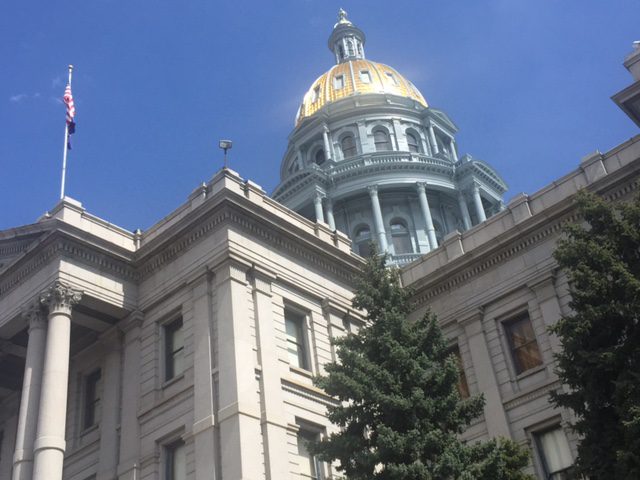A summary of the list of recommendations on the implementation of the OBBBA in Colorado regarding public benefits systems and work requirements.
Recent articles
CCLP testifies in support of Colorado’s AI Sunshine Act
Charles Brennan provided testimony in support of Senate Bill 25B-004, Increase Transparency for Algorithmic Systems, during the 2025 Special Session. CCLP is in support of SB25B-004.
Coloradans launch 2026 ballot push for graduated state income tax
New ballot measure proposals would cut taxes for 98 percent of Coloradans, raise revenue to address budget crisis.
CCLP statement on the executive order and Colorado’s endless budget catastrophe
Coloradans deserve better than the artificial budget crisis that led to today's crippling cuts by Governor Jared Polis.
Legislative Update: Jan. 25, 2019

Bills to Watch: HB 1118 and HB 1001
Under current Colorado law, a landlord is only required to give tenants three days’ notice to resolve a lease violation, pay any unpaid rent or vacate a property. If the tenant fails to do so, the landlord may file an eviction action to force the tenant out of the property.
Generally speaking, three days is not enough time to access rental assistance, relocate a pet, transfer children to a new school, make up for a delayed paycheck or negotiate a remedy that could reverse the eviction process. So in many cases, once the petition is filed, a forced move will follow.
Developed by CCLP and Colorado Coalition for the Homeless and sponsored by Rep. Dominique Jackson, Rep. Rochelle Galindo and Sen. Angela Williams, House Bill 1118 would extend the notice required before a landlord can file for an eviction for a non-substantial lease violation from three to 14 days. This extension ensures that Colorado tenants would have more wiggle room to address a landlord’s complaint without precluding a landlord from charging and collecting late fees for overdue rent.
One of two eviction-related measures led by CCLP this session, the bill will be heard by the House Business Affairs and Labor Committee on Feb. 6. Learn more about HB 1118 in this blog by CCLP’s Jack Regenbogen.
Recent data that suggests that the delivery of hospital care in Colorado is severely inefficient. The Denver Post reported on data that show Colorado hospitals spend 33 percent more on capital and administrative costs per patient than the national average. Between 2009 and 2016, overhead spending increased nearly twice as fast as the national average and Colorado hospital prices spiked by 79 percent.
At the same time, government spending on Colorado hospitals has increased substantially since the implementation of a program referred to as the hospital provider fee. Since the hospital provider fee program was implemented, the program has increased hospital reimbursement an average of more than $200 million per year. The increase in hospital reimbursement was supposed to reduce the amount of hospital costs shifted to private payers. Instead, the costs have only increased.
House Bill 1001, a transparency measure sponsored by Rep. Chris Kennedy and Sen. Dominick Moreno and supported by CCLP, would require hospitals to disclose utilization and financial data to the Colorado Department of Health Care Policy and Financing. HB 1001 will ensure that Colorado communities and policymakers have the information they need to assess and understand what will and won’t work to rein in rising costs. Approved to the House Committee on Health and Insurance, the bill is scheduled to move the House floor for a vote on Friday, Jan. 25.
On the Radar: HB 1004 and HB 1013
We’re pleased to report that HB 1004, which would take the first steps toward creating an affordable, insurance option that takes advantage of the efficiencies of publicly funded insurance was approved by the House Health and Insurance Committee on Wednesday, by a bipartisan vote of 9-2.
Developed by CCLP in partnership with the Bell Policy Center, Healthier Colorado and Colorado Consumer Health Initiative, the measure would advance work on developing an insurance plan that uses state infrastructure to reduce premiums in the individual and possibly the small-group markets. It requires the Colorado Department of Health Care Policy and Financing and the Colorado Division of Insurance to model and develop a proposal for legislative approval so that implementation could begin in 2020.
CCLP strongly supports this innovative, measured and pragmatic solution to increase health insurance options throughout the state while addressing the health care affordability crisis.
Another CCLP-led proposal, HB 1013, would extend Colorado’s child care tax credit for households earning less than $25,000 beyond 2020, when the credit is due to expire. The tax credit is essential in defraying the cost of child care, which is consistently one of the highest-ticket basic needs for working families according to our recently published 2018 Self-Sufficiency Standard report. Child care is essential to employment which is essential to reducing poverty. On Thursday, the House Finance Committee approved HB 1013 on vote of 10-1. Though HB 1013 originally made the child care tax credit permanent in Colorado, the bill was amended to extend the credit to 2028, at which time it could be renewed again.
– By Bob Mook
